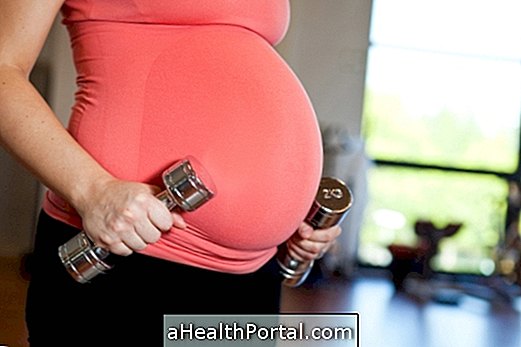Women who have never exercised and decide to start these exercises during pregnancy can harm the baby because in these cases there is a risk of:
- Injuries and strong impacts on the mother's belly,
- Decrease in the amount of oxygen to the baby,
- Decreased fetal growth,
- Low birth weight and
- Premature birth.
The best way to know if the exercises are safe in pregnancy is to talk to the doctor and the gym teacher before starting the exercises and if the woman did not practice any exercise before pregnancy, she should choose lighter exercises with less impact .
However, even the pregnant woman who was already accustomed to bodybuilding before becoming pregnant needs to be careful, not performing very intense workouts, or training more than 3 times a week. Each workout should be 30 minutes to 1 hour, with series of 8 to 10 repetitions per exercise. Another important care is to opt for low-impact exercises without forcing the pelvic region, abdomen, and back, which should be instructed by a physical education professional.

Who can not do bodybuilding in pregnancy
Women who did not exercise should rest during the first trimester and start activity only in the second trimester when the risk of miscarriage decreases.
In addition to being contraindicated for women who did not practice bodybuilding before becoming pregnant, this type of activity is especially contraindicated for pregnant women who have:
- Heart disease;
- Increased risk of thrombosis;
- Recent pulmonary embolism;
- Acute infectious disease;
- Risk of preterm birth;
- Uterine bleeding;
- Severe Isoimmunization;
- Morbid obesity;
- Anemia;
- Diabetes;
- Hypertension;
- Suspected fetal stress;
- Patient without prenatal care.
The ideal is always to go to the doctor before starting any physical exercise, to evaluate the health of the pregnancy and ask permission to exercise, and to be accompanied by a physical educator to do everything safely. See when to stop physical activity during pregnancy.
Recommended exercises for sedentary pregnant women
For women who do not practice weight training before pregnancy, it is best to do low-impact physical activity for the spine and joint, such as Pilates, swimming, water aerobics, yoga, aerobics, walking, and pedaling on a stationary bicycle.
In addition, doing small exercises throughout the day also bring benefits to the body as long as together they complete at least 30 minutes of physical activity. Thus the woman can do 3 times a day 10 minutes of walking, for example, that will already have positive results for the pregnancy.
Benefits of Physical Activity in Pregnancy
Mild or moderate physical activity during pregnancy has the following benefits:
- Lower maternal weight gain;
- Prevent gestational diabetes;
- Less risk of preterm birth;
- Lower duration of labor;
- Lower risk of complications at delivery for both mother and baby;
- Reduce the risk of cesarean section;
- Increase the physical capacity and disposition of the pregnant woman;
- Preventing varicose veins;
- Decrease back pain;
- Help control blood pressure;
- Increase flexibility;
- Facilitate recovery after childbirth.
In addition to the benefits to the body and to the baby, exercise also helps increase a woman's self-esteem and reduce stress, anxiety and the risk of postpartum depression.

Exercise not recommended for pregnant women
Among the exercises that are not recommended are sit-ups, push-ups, jumps, and exercises that need balance because they impact the belly or increase the risk of falls, which can harm the baby.
Thus, exercises or sports such as volleyball, basketball, horseback riding, high-impact gymnastics and diving should be avoided altogether during pregnancy, even by women who have already practiced these activities before becoming pregnant.
In addition to practicing bodybuilding, see other exercises that facilitate normal birth.























